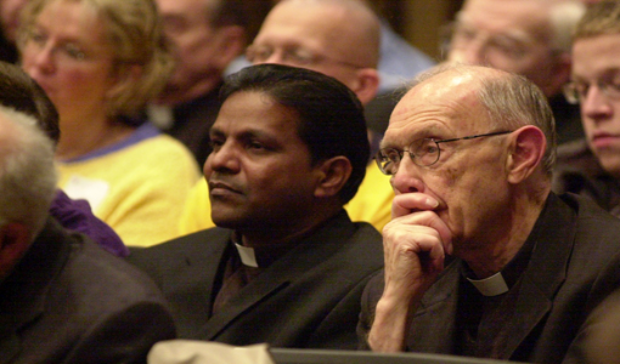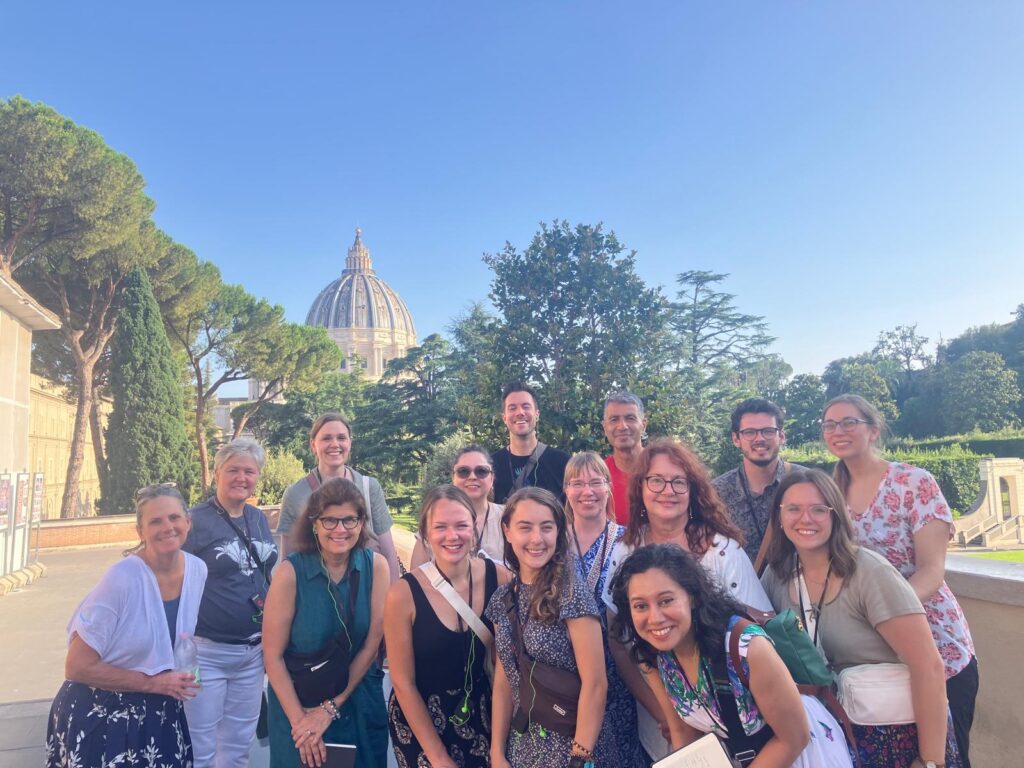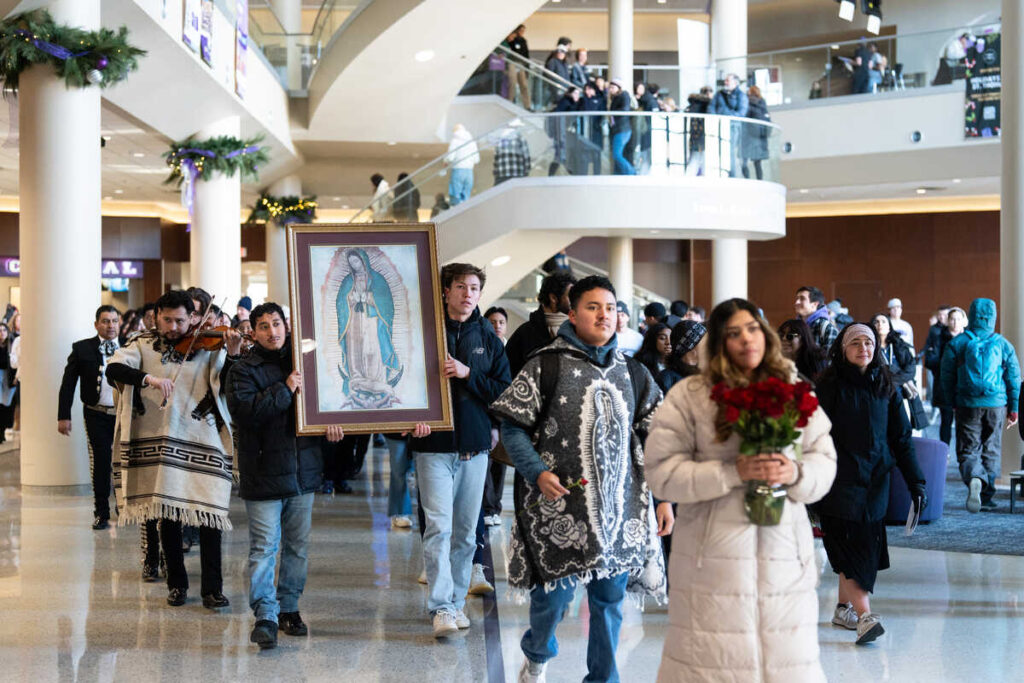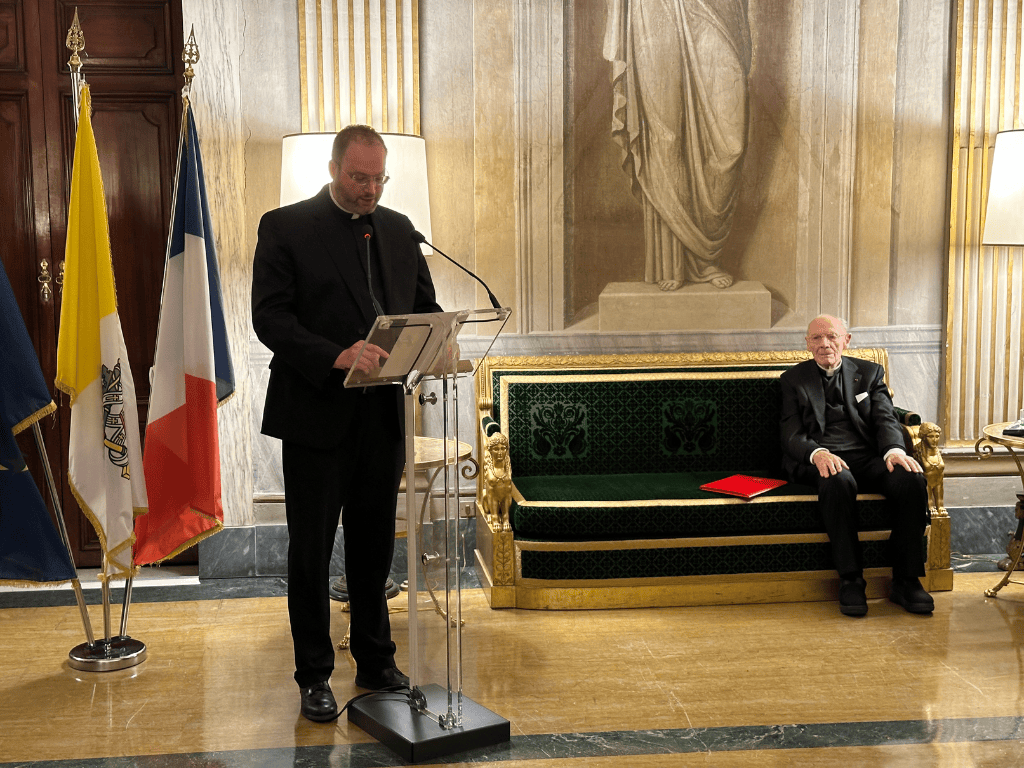The following exerpt is from the Oct. 16, 2000 St. Thomas lecture by Father John Kavanaugh, S.J.
“College and the Cultures of Life and Death” – the title is much more complex than it sounds, and the words can be complicated.
Culture is a word people use often. It stems from the Latin word, cultus, or cult. There was an agricultural cult at the time for the farmer, the agricola, the cult of productivity. And we get agriculture out of that. Agriculture is something humans do. They cultivate their product and their product feeds them, and keeps them alive. All the living parts of culture are things that keep the human body and spirit alive. In some ways, agriculture is the way we avoid death. And in many ways, culture is the way we avoid death. Culture is all the artifacts we have, our institutions, our production, and the works of human hands.
In many ways, culture helps us process what it means to be men and women on the journey, to try to understand who we are and what our destiny is. But the danger of culture – whether it’s culture of science, nations or politics – is that we can use it to repress death itself. This becomes a strange paradox. We start out with culture by affirming life, trying to extend life, and we can start relating to it in such a way thatwe can turn culture itself into an instrument of death, so that we don’t have to face our own death.
I recently read Annie Dillard’s series of meditations about death and the cultures of death titled For the Time Being. The cultures of death are the ways men and women use culture to repress their own death by killing others, by domination, by pretending that they’re not human beings, that they’re not fragile. Dillard talks about the wall of China and all the people buried in that wall, and about all the mass graves of different civilizations.
There’s one moment when she recounts the story of Nehru, the leader of India. He goes to Mao Tse-tung, to try to convince him to not use the atomic bomb. Nehru wanted to be a pacifist and he pled with Mao, saying, “We could lose millions of people with a nuclear exchange.” Mao replied, “I can lose 300 million.” And Nehru turned ashen at this fact that people were like dust, and that a person in the culture of death could consider 300 million people totally expendable.
"When we realize that the only thing that’s unique about us is the personal gift of love, life becomes pretty frightening."
Pope John Paul II knows the history of cultures and of death, and he knows our contemporary atrocities. He knows what happened in Cambodia, with the Third Reich, and with Stalin. He knows what happened in Rwanda, Chechnya, Uganda, Kosovo, and now Palestine. The cultures of death are at war now, and it will not stop as long as we use our cultures to perpetrate death so that we do not die. This is the problem.
The United States and Allies won WWII. We won the war by inflicting more death thanthe enemy. We were able to kill more. Of course, we can say the right side won, and I suspect the right side did win. But it was done at a terrible moral cost. I was in a debate once with Phyllis Schlafly. She said, “God gave us this bomb. This is our great gift. And it’s easy for you to say, Father, since you don’t have any kids, that we shouldn’t have the bomb. If you had kids, you’d know the difference.” But what was she saying, that the bomb is my hope and my salvation? The power to inflict death becomes our hope. And the cultures of death, which pose our hope and our security and our salvation,lead to the massive degradation of human existence. This is what happens when a culture is not oriented in life, but in death.
So much of our value has been squeezed out of us by a culture that, in many ways, does not enthrone the living person but enthrones the objects we are led to believe will save us and prevent us from our great wounds. I often think of the example of Peter in the Gospels. After Peter fails at everything in terms of achievement and production, after he betrays even what he thinks he loves the most, it’s amazing what Jesus is interested in. When he goes to Peter, he doesn’t try to iron out the past or talk about the future. All Jesus says is, “Do you love me?”
This is part of our problem. When we realize that the only thing that’s unique about us is the personal gift of love, life becomes pretty frightening. It’s much easier to do something we can measure, some kind of quantitative analysis of our worth, rather than something that is rooted in our frailty. Saint Francis de Sales said that all love is a destitution. And rather than experience the destitution, the poverty of our humanity, weturn to the ways of avoiding our death, our frailty, our poverty, and we avoid our interior world entirely.
This is mirrored in our relationships, too. As one married man said to me, “You know, John, if you’re going to get married and have kids, you’re going to die a thousand deaths.” If you’re going to care about anything, you’re really going to experience dying. Dying to egoisms, dying to fears. So rather than care that much, rather than enter into the frailty of our relationship as men and women, as persons, we avoid that, and that relationship can die as a result. People wind up not experiencing the great joys of what we give to each other in relationship, which is often just the poverty of our abilityto love.
There was a girl I heard about through a midwife. The girl was the product of whatI would call the culture of death. She was abused sexually since she was eight. She was 15 and had no family when she went to see the midwife. The midwife said to her, “I’ve got news for you. You’re pregnant. But I’ll tell you what, if you come in three times a week, we’ll talk and I’ll try to get you ready. I’ll tell you what it’s like to carry a baby, and how it’s going to change. I’ll help prepare you and be with you when the baby is born. And you can come to see me as long as you’d like after that baby is born. I’ll show you how to feed, clean and take care of the baby.”
The young girl agreed to come in for the next three months, and with the midwife’s helpshe had the baby. She also saw the midwife for the following six months, but then disappeared. Five years later, the midwife called me and said, “Guess who I heard from? The girl who disappeared! She sent me an invitation.” The invitation said, “I’m sorry I never wrote to you or got back to you. I wanted to surprise you. That’s why I’m inviting you to my graduation as a practical nurse. You see, I wanted to be like you,because you’re the only person who ever cared about me.” There’s nothing like the power that comes out of our frailty.
There is a theory of human dignity catching on in our culture that says that somewhere along the line you’re going to lose your dignity. It’s usually when you’re going to be dependent, when you’re helpless. That’s the thing we’re all afraid of, dependency and helplessness in old age. You know why? It is because we’re afraid of the margins of our existence, and we’re afraid of this body. That’s why so many scientists try to say that human beings only consist of mental brain states, and deny the fact that we’re flesh andblood.
We’ve got a number of philosophers like Peter Singer, who basically state that infants are more like fetuses than real humans, so infanticide is not wrong either. Peter Singer’s got the chair of ethics at Princeton. Why do we disassociate not only from infants, but also from the pre-born? The U.S. Supreme Court is deliberating on whether it’s better to cut that patient up inside the womb or outside the womb. What has stilled our sensibilities? In a way, I think it is fear of our origins, of this great contingencyof life. But we can generate more sympathy for mice. Why is this? What is our problem with our origins, our animality? These are little animals. At least treat them like you would treat an animal. There’s a block here, and it’s us. We’re afraid of these bodies, afraid of their woundedness, their origins, their destiny. That’s why we’ve got problems at the end of life.
Judge Reinhart, of the 9th Circuit Court of Appeals, says, “When you are at the end of life, and you are diapered, and dependent, and incontinent, obviously you have the right to a dignified death.” I often think of a young woman I knew named Mev Puleo. She is one of the most beautiful human beings I have ever known, a photojournalist filled with passion and zeal. She photographed the poor around the world. She was a great speaker, and was invited to the Denver World Youth Day. She had beautifulblack hair and a dynamite personality.
Mev developed brain cancer at the age of 32, two years after she got married. I often wonder when she lost her dignity. Was it when they cut off her beautiful hair? Was it when she could no longer walk, and had to be carried to receive an award recognizing her as an outstanding Catholic woman? Or was it when she finally could no longer speak and had to point out “yes” and “no” on a little machine to answer questions? Did she lose her dignity when she needed full-time care? Is that when she lost her dignity, when all that she could do was receive love? Maybe that is the problem. Because at the end, Mev Puleo became like the poor that she loved. She, who had wanted to give them vision, had now lost her sight. She, who had wanted to give them voice, had now lost hers. And all that she had was what she shares with every mother’s child, the power to evoke our love, and the power to bestow it.
Don’t buy this bill of goods of dignity. There’s an ideology behind this. Dignity is not afunction of what we produce, not a function of cultural artifact. It is of what we are, and of how we were made, and of our origins, and of our mighty destiny. This mighty destiny of the Eternal Word is made flesh in us. Consequently, the culture of life involves our own willingness to face what our culture thinks is the worst thing possible – helplessness.
We are already restructuring ourselves, thinking that we can get around the frailty of our human bodies. There are these ads out at Harvard and other Ivy League schools, asking for women who are blonde, 5’9” or taller, and have an IQ of more than 140, to donate their ’re alive for about two or three weeks. And if, for example, one’s a hemophiliac, get rid of him and raise one that is not a hemophiliac. This is from Singer, a reputable scholar at Princeton. And it goes on in the name of humanism. Joycelyn Elders said that thanks to abortion, the rate of children with Down’s Syndrome has gone down. But I often wonder, would the world be better off without Down’s Syndrome children? I’ve not been able to convince myself of that. I don’t know why. Maybe it’s because they have evoked my love in ways that others have not.
The stakes are high. And it depends on what “Until I touch those wounds …” So Jesus comes and tells Thomas to enter the wounds. They’re still there, but they’re glorious. Enter the wounds of humanity, the wounds of yourself, the wounds of this Church, the wounds of my body, and have them transformed.
What’s so paradoxical about the culture of life is that it is only found when we’re willing to enter into the valley of death. That is why Paul can write that there are only three things ’s the only reason why he could write to the Romans that no height, no depth, no principality, no power, nothing past, nothing yet to come, can ever separate us from this radical reality of life. Once we face these wounds, we experience a re-healing of our life, knowing that death is not the last word.
"The culture of life involves our own willingness to face what our culture thinks is the worst thing possible – helplessness."
I’m trying to suggest that the culture of love is fed by this truth. It’s a different kind of food, very similar to the Eucharist. It’s very similar not only in the fact that we receive the very body and blood of Christ under the images of food, but also in that we receive the body and blood of Christ under the image of the very least of us, even the most broken. And often it is only those people who can call forth from us the fearlessness that we can let go of our utter terror at the thought of not having control, of not managing, of not producing, and finally enter into the mystery of the wounds that become glorious.
If you want to start building a culture of life ’ve got to move away from the notion of the word “college.” It comes from collectum, and it’s a passive word. I think that to cause a culture of life, you’ve got to change the collectum into a communitas or communio, where you have men and women who are unafraid to face their own interior life, their frailty, their fears, their deepest hopes, their deepest longings, and who are unafraid to share them in covenant, in community. Because the wounds of relationship and the wounds of our own heart and also the wounds of the world need not be run from. They can be transformed, and not repressed.
College, then, becomes the community of faith, and it becomes a lover of life. And it becomes men and women, even if there’s five out of this group, or 10, who are men and women of the cultivation of life that’s rooted in these great virtues of faith, hope and love. You’ll transform the world, and you’ll make it worthwhile for this university to have existed, just by those four or five people that God might raise up in our midst.







